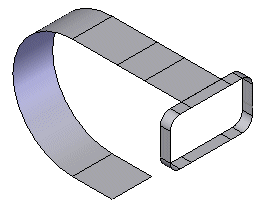The figure below shows a simplified model of the skeleton of a horse ride-on usually seen in playgrounds. The weight of the horse is 10 Pounds.
Four static studies are used to simulate load conditions as follows:
- The Sitting study simulates a child weighing 50 Pounds sitting on the horse.
- The Standing-50 study simulates a child weighing 50 Pounds standing evenly on the foot holder.
- The Standing-100 study simulates a person weighing 100 Pounds standing evenly on the foot holder.
- The Standing-200 study simulates a person weighing 200 Pounds standing evenly on the foot holder.
A separate study is used for each weight for the standing case because the weight of the horse is constant and it is applied to a different face than the standing load.

It is estimated that persons of different weights will use the ride-on as shown in the following table:
| Weight (Pounds)
|
Percentage of usage
|
|---|
| 50
|
75% |
| 100 |
20% |
| 200 |
5%
|
These considerations are accounted for when defining fatigue loads.
In this lesson, you learn the following:
- Performing fatigue analysis on shell models
- Defining multiple fatigue events
- Assessing fatigue analysis results